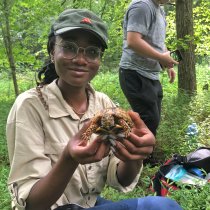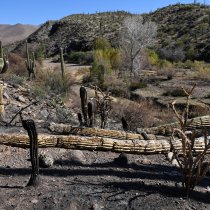Helping Early Career Scientists Leverage the NEON Project
May 14, 2018
As the NEON project gets off the ground, NEON project scientists are reaching out to ecologists who are just starting their careers. And for good reason—today's undergrads, grad students and newly minted PhDs are likely to be the prime users of NEON data over the life of the project.
Megan Jones, a Battelle staff scientist and a science educator for the NEON project, says, "NEON is a 30-year project, and we're just getting started. While the data we have now are already generating useful insights, the real benefits of the project won't be seen until we study the long term data gathered over the next years and decades. Scientists who are just beginning their careers now will be the ones to carry the project forward and use these data for their research."
That's why Battelle is working with the National Science Foundation (NSF) and other organizations to develop workshops and educational opportunities aimed at helping early career scientists get started with NEON data. Many of these early career scientists are already working with NEON data and taking an active role in shaping the future of the NEON project.
Early Career Contributions to NEON Science
Early career scientists are active in the advising and operations of the NEON project. Their participation includes serving in advisory roles on the Science, Technology & Education Advisory Committee (STEAC) and Technical Working Groups (TWGs) and taking active roles in recent workshops seeking to advance science and collaboration between the NEON project and other networks.
Gene Kelly, a Visiting Scientist on the NEON project from Colorado State University, says that early career scientists are natural first users of NEON data, because scientists starting their careers now are more likely to have been exposed to data analytics skills in their university programs. He especially values the contributions they are making in the workshops and working groups. "I am so astounded by some of these scientists and the way they talk about the data," he says. "They are also more comfortable 'switching lanes' and working across disciplines in an open-science environment. These are the skill sets that will be needed to get the most value out of the NEON data."
Gene says that workshops that bring together scientists from across disciplines and at all stages of their careers are helping to bring about a more open and collaborative approach to ecology. One recent workshop, "Using Observation Networks to Advance Earth System Understanding: State of the Art, Data-Model Integration, and Frontiers" (a joint project between Battelle, the Critical Zone Observatories (CZO) network, the U.S. Long Term Ecological Research Network (LTER), the International Long Term Ecological Research Network (ILTER), and the International Soil Modeling Consortium (ISMC)), drew 55 researchers, including several early career scientists sponsored through a grant by NSF.
Hillary Dugan, an Assistant Professor at the University of Wisconsin-Madison Center for Limnology, was one of the attendees. She said it was exciting to see the collaboration between the observatory networks as well as the new possibilities presented by the NEON data. "It's rare to have data from both terrestrial and aquatic ecosystems side by side," she says. "Using the NEON data, we'll be able to better model and understand the terrestrial drivers that influence aquatic systems."
Changing Skill Sets: Learning to Use the NEON Data
The NEON project has put together educational resources and opportunities for scientists at all stages of their careers who are interested in learning more about NEON data, ranging from online tutorials to week-long data workshops. Gene explains, "The skills sets needed for ecology have changed since many of us were in school. Data analytics skills are increasingly important to work with 'big data' generated by observatory projects like NEON. We're creating educational programs to fill these knowledge gaps and help scientists understand how to take advantage of the wealth of data that the NEON project is producing."
NEON data training opportunities include:
- Online data tutorials, available on the NEON Science website. These interactive, self-paced modules each focus on a specific aspect of using NEON data, allowing scientists to get help on a broad range of data analytics topics on their own schedule.
- Workshops, offered at NEON headquarters in Boulder or at scientific conferences across the country, provide opportunities for in-person training, discussion and collaboration for students and researchers. Workshops range from half-day to two-day and cover a variety of topics, such as the use of eddy covariance data, working with times series in R using NEON data, and using the NEON API.
- Data Institutes: These annual, weeklong institutes offer a deep dive into using NEON data and how to apply data analytics techniques to ecological data. Each institute has a different data theme or topic, allowing participants to gain theme-specific skills and knowledge and apply them to ecological data from many different sources, including NEON. In addition, all institutes teach core data science skills with a focus on reproducible methods.
While these opportunities are open to all, early career scientists are usually well represented among attendees. The workshops and data institutes have been well received by participants.
NEON Project Seasonal Job and Internship Opportunities
In addition to workshops and training materials, the NEON project supports early career scientists through internships and seasonal work opportunities. Each year, the NEON project employees hundreds of field technicians to collect samples and observational data from the NEON sites. Technicians receive training in field and laboratory methods and protocols and gain valuable experience and professional connections. A variety of fieldwork opportunities are available to support NEON's aquatic and terrestrial programs, enabling researchers to look for positions that align with their areas of interest. Field technician positions are usually filled in the fall for the following spring and run from May through September in most locations.
For the last five years, NSF has also funded research internships for students and recent graduates at NEON headquarters in Boulder. While the NEON project is not hosting interns for 2018, the program is expected to return in the future.
Upcoming Opportunities for Early Career Scientists
Early career scientists have many opportunities to get involved with the NEON project in coming months. Here are a few to look for:
- NEON-ESA Early Career Scholars (NCES) Program: This joint program between the NEON project and the Ecological Society of America (ESA), funded by NSA, provides early career scientists wishing to attend the ESA annual meetings. For 2018, the program provides $1500 reeimbursemt to offset travel and registration costs to attend the meeting. Participants will also have the opportunity to attend a series of NEON workshops at the conference. (August 5–10, 2018) Application deadline: May 18, 2018.
- Data Institute 2018 – Remote Sensing with Reproducible Workflows in Python: During this annual course, participants will work with hyperspectral, LIDAR and RGB camera data collected by NEON’s Airborne Observation Platform (AOP). (July 9–14, 2018) Registration now closed.
- NEON Data Workshops at ESA: NEON workshops at the ESA annual meeting include "Access and Work with NEON Data" (August 5), "NEON Connected" (August 5), "NEON Resources for Your Research" (August 6) and "Innovative Continental-Scale Ecological Research Enabled by NEON" (August 6).


